If only I had a dollar for every person who told me they’re working on their health by adding a tablespoon or two of coconut oil to their smoothie, porridge, coffee or just taking it straight off the spoon! No product seems to be more misunderstood in terms of its health qualities. In this post, we’ll look at whether coconut products are healthy or not?
Coconut nutrition facts
Coconut products come from a plant. This gives it a ‘healthy’ feel. However, unlike most plant foods, it is high in saturated fat, the type that is considered unhealthy. This is a fat shown to cause inflammation in our bodies. In fact, coconut oil contains more than 90% saturated fat. Comparatively, butter is closer to 60% saturated fat. But because it comes from a plant, is it as unhealthy as animal fats?
Yes and No.
Different coconut products have different health profiles. We will look separately at the effects of consuming coconut oil, coconut ‘meat’, coconut ‘water’ and coconut ‘milk’. And become clear on whether coconut products are healthy or not.
Coconut oil – its marketing
Coconut oil was first brought to the public eye by Bruce Fife in his 2002 book, “The Coconut Oil Miracle”. Mr Fife stated in his book that coconut oil “can help weight loss for the obese and weight gain for the over-skinny as well as reduce heart disease and many, many other health problems: it may prevent and even reverse all sorts of things from inflammation to infections. And allergies. And skin conditions, including fungus.” A true miracle, it seems.

Mr Fife’s credentials: before writing his book on coconut oil (and another subsequent half dozen more on the same topic) he had published books on ventriloquism, clowning, balloon-making for children as well as juggling. In between making balloon animals and writing about coconut oil, he became a naturopath. He has since written more than a dozen books on oil pulling, ketogenic diets and miracle cures for many diseases including autism, vision problems, arthritis and poor vision.
This to say, Bruce Fife is not a researcher. Clearly he learns about a topic then writes a book on it. This does not make someone an authority. An authority dedicates their life to writing about one thing or several related things and has completed in-depth study in the area. Despite these dubious credentials, Fife’s coconut oil books are what have driven this coconut oil fad which is still going almost 20 years later.
What does the science actually say about this ‘miracle cure’?
Coconut oil – the science
First, the good news – any of the benefits of eating coconut oil (or cooking with it) have only ever been found in animal studies or in petri dishes. Not on humans. So cooking your dog’s food in it may bring it some benefits.
And just as Mr Fife says in his book – coconut oil does indeed help control fungal overgrowth (Candida) – in mice! But that was only discovered in 2015 (remember that the book was first written in 2002), and it hasn’t yet been trialled in humans.
Second, the bad news: a study in 1998, this time on humans, found that the effect of coconut oil on blood plasma, lipoproteins and laposterol levels were the same as for butter – VERY BAD NEWS. In other words, coconut oil is not good for the arteries.
It is said that coconut oil is good for the heart. However its saturated fat raises LDL (“bad”) cholesterol, and LDL cholesterol levels correlate with risk of heart attack and other cardiovascular events. It can, in some cases, raise HDL also, but then LDL rises also so the heart risk is not lessened at all. <This> meta-analysis of 16 studies investigated the effects of coconut oil on cholesterol, weight, fat percentage, waist measurement, fasting glucose and C-reactive protein (an inflammatory marker in the blood). It concluded that coconut oil consumption results in significantly higher LDL-cholesterol than (consumption of) nontropical vegetable oils.
Coconut oil in the diet
A few years ago I watched some indigenous people in Vanuatu making coconut oil – from actual coconuts, with hand-made primitive implements. You can read <here> how it was done, with photos. It’s interesting to note that people living in the tropics who consume a lot of coconut oil seem to avoid heart disease – while eating their traditional starch-based diet (yams, taro). But when they move toward a Western diet and continue to eat coconut oil, they achieve the same heart disease rates as we have in the West. In other words, coconut oil provides no heart protection against the standard Western diet.
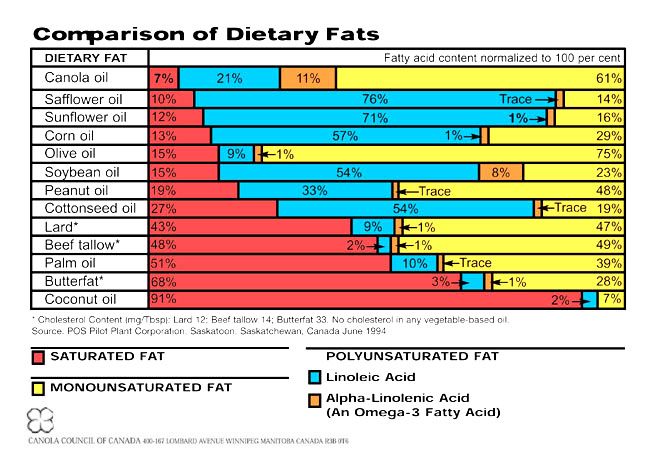
The nutritional profile of 1 Tablespoon of coconut oil is –
- no cholesterol (good),
- no sodium/salt (good),
- no sugar (also good), but also
- no fibre,
- no Vit C,
- no Vit A,
- no calcium,
- no iron.
What’s in it then? It’s virtually nothing but FAT! 14g of fat, that is 116 calories.
There’s next to no nutrition in coconut oil, and a lot of calories for no nutrition! Fat calories get stored as fat – we only need fat for the nutritious elements on board. Coconut oil has none.
Read in <this post> about how oil, including coconut oil, can sabotage a weight-loss diet without you realising it. You will see why using spoonfuls of coconut oil for weight loss is nothing but a scam.
I’d rather leave coconut oil for the dogs and mice – where at least it has been found to have some benefits in all those animal experiments!
Is this coconut product healthy or not? Definitely NOT healthy at all.
Coconut Milk
It is clear that we should be avoiding coconut oil.
But coconut milk? It’s in so many southeast Asian curries. Surely it can’t be too bad!
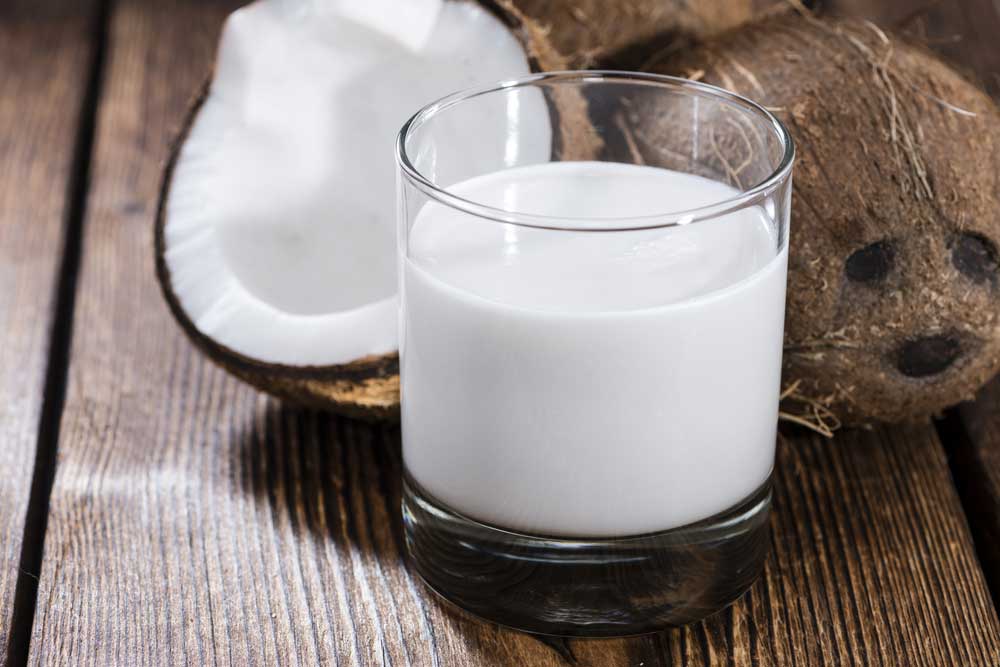
No – its high saturated fat content makes it as damaging for the arteries as a fatty beef burger. Just the same as coconut oil.
Best to avoid it.
But how do Asians cope with consuming so much of it in a traditional diet?
Traditionally, there were no cans of coconut milk – people grated the coconut meat and put it in the curries. And that makes ALL the difference, as we shall now see.
Whole coconut meat, fresh and dried
Whole coconut meat actually lowers cholesterol. How? Like all whole plant foods, it contains fibre. As fibre moves through the digestive tract, it traps cholesterol released from the body in bile and carries it out of the body. You can read more about this clever system <here>.
So the fibre in the whole coconut product mitigates the negatives of the liquid part, the milk.

This includes coconut flakes (watch for added sugars), desiccated and shredded coconut as well as coconut flour. It also includes fresh coconut meat.
However, coconut meat is very high in calories – as it contains a lot of fat. One cup of fresh, shredded coconut meat is about 280 Calories. And it’s very easy to eat a cupful once you start!
Are these coconut products healthy or not? Coconut meats, fresh and dried, are both OK and bad. Not bad for the heart, but very bad for the waistline. And certainly without any redeeming qualities that would class them as ‘health foods’.
Coconut water
The trendy sports drink – with a nutritional profile like blood plasma – can be substituted in a blood transfusion emergency apparently, according to one study. I’d check with the paramedics first though!
Here are the nutrition details:
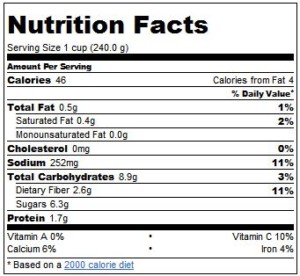
Coconut water does contain some minerals in a 1-cup serving – plus a relatively high sodium content! The recommended daily sodium intake in Australia is no more than 1 tsp or 2000mg/day. However, the National Health and Medical Research Council considers around 1000mg or less per day a better goal. I agree! With that amount, coconut water constitutes ¼ of the day’s sodium in 1 cupful.
Coconut water is low in calories – and fairly harmless health-wise. It causes bloating for some people though. Drink it if you like it, if sodium is not an issue for you.
Are coconut products healthy or not? When it comes to coconut water, the answer is a maybe. Not positive – but not harmful either.
Are coconut products healthy or not? Summing Up.
Here’s the summary for HUMAN consumption of coconut products:
Oil
Milk
Meat/dried, shredded, flaked, fresh
coconut water
Bad for heart & weight
Worse for heart
OK for the heart. Not so good for weight.
harmless for most, but quite high in salt, and can cause stomach upsets for some.
Are coconut products healthy or not? None of them are healthy. None of them are needed. Some are downright UNhealthy.
Best to eat them rarely, in small quantities, if at all.
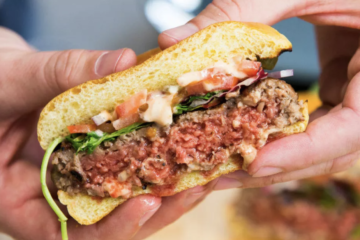
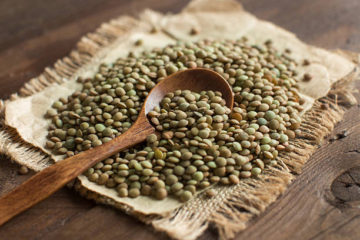

4 Comments
Grace · May 1, 2021 at 10:38 am
Interesting post Mary, though you didn’t cover those who need to gain weight and find it hard to fit enough calories in their diet daily. Would coconut products still be unhealthy?
Mary Collis · May 4, 2021 at 7:51 am
Answering this question involves understanding the spectrum of action needed to maintain health. What I mean by that is – if a person has a potentially fatal disease, the changes that will be necessary for them to make in their diet and lifestyle (including foods to avoid completely) will be much greater than in a person who is generally healthy but a little overweight. The person who is generally healthy but a little overweight will need to make fewer changes to achieve better health – than the person with a serious disease but will need to be more restrictive with certain foods than the normal weight, completely healthy, person.
Yes – coconut products contain inflammatory fats – that is a fact. They are also high in calories, and for an underweight person, this may be seen as a benefit. The thing to look at is the health of the lower weight person. If they are healthy, energetic, sleeping well, not given to recurrent infections, AND are eating a high plant diet, they may well be able to include some coconut products with no ill effects at all. But if they are underweight because they are chronically ill, are on drugs causing poor food absorption, smokers, chronic starvation dieters – then eating coconut products is only adding calories which are not helping their health at all.
For someone eating a high plant food diet (of over 35g fibre daily) – they could add a range of not-so-healthy foods and not be affected at all. I definitely use coconut products as condiments (coconut flakes on salads, a splash of coconut yoghurt on various meals or over fruit salad). But if I was overweight or ill, I may restrict them, or even cut them out entirely, depending on what the health issue was.
Emma · January 3, 2022 at 7:52 pm
I’m confused. I thought butter and coconut oil were good for you? It’s different everywhere you read . I just want to do the right thing by my children and we’ve been eating butter and coconut oil? Thanks
Mary Collis · January 6, 2022 at 12:19 pm
No, neither are heart-healthy foods. In Asian and Pacific Islander societies, traditionally the whole coconut was used, so the fibre in it slowed its absorption. And traditionally, exercise levels were high just for survival, so excess calories got burned up, unlike today. Both can be used a CONDIMENTS in small amounts in the context of a healthy plant-based diet, but better to cook with no oil or just a spray of olive oil. For children a little more olive oil is helpful and is not implicated with heart disease.